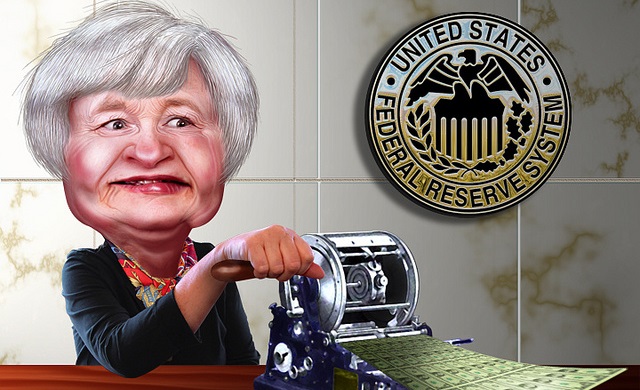Janet Yellen has held the office of Chairwoman of the U.S. Federal Reserve for barely six months. Although any change following Ben Bernanke’s tenure would have been certain to engender more change than just the chairmanship itself, Yellen stunned economists and investors today in “the clearest statement yet that the new U.S. central bank chief has made that she does not anticipate using monetary policy to counteract the prices of stocks, bonds or real estate from rising out of line with fundamental values.”

It was during her confirmation hearings in November 2013 that she said, “I would like to see monetary policy first and foremost directed toward achieving those goals Congress has given us,” and that she “would not rule out monetary policy having a role in deflate economic bubbles [to avoid] financial panic.” Of course, that was, as I mentioned, in her confirmation hearing. That’s a lot like a politician’s promises before being elected.
Today, as Ms. Yellen addressed an assembly of the IMF, she announced that she believes that regulation trumps policy. Her comments were directed at concerns of increased risk-taking across the entire spectrum of the financial system as yet another bubble may be forming as stock markets are soaring to new heights.
The Wall Street Journal described Ms. Yellen’s comments at indicating “a strong reluctance to raise interest rates to address a build up of financial risk in the banking system.” In other words, she is saying that, although policy dictates an increase in interest rates, she, in the mold of Barack Obama, is sending out a signal that she is willing to disregard policy in favor of a situational ethic, which is no ethic at all.
Why We Should Be Concerned
Policy is the foundation upon which all practices and procedures are built in any stable institution or government. Policy determines rights and the limits of those rights. Policy is the standard against which all actions are judged. The entire free enterprise system is based upon the establishment of and the adherence to financial policies.
Regulations are the bane of any policy. Policies are executive. Regulations are restrictive. Policies establish the broader freedoms of operation. Regulations restrict those freedoms. Benevolent leaders embrace policy. Bureaucrats feed on regulations.
One of the beauties of the sport of football (soccer) is the scope of the game. There is a great deal of freedom in the playing of the sport, which is exactly what makes it so popular. The play of the game itself is not burdened by an ever-changing plethora of regulations. Were that ever to happen, no one would watch and no one would want to play.
Just a bureaucrats should not have the ability to supersede legislation, neither should regulations have the same priority over regulations.
Janet Yellen is leading the U.S., and the world, down a slippery slope that will eventually end with the strangulation of the free enterprise system. The free enterprise system is not one in which everyone scores the same as everyone else. It is competitive, and it only works when the players are allowed to play.

 Hot Features
Hot Features













